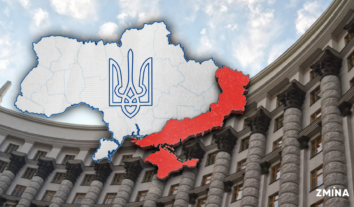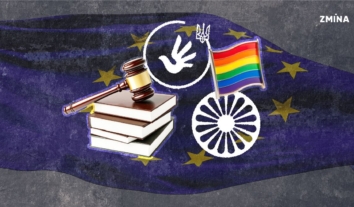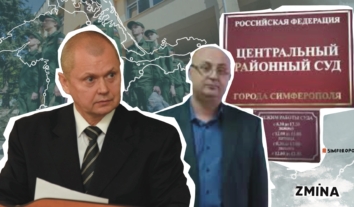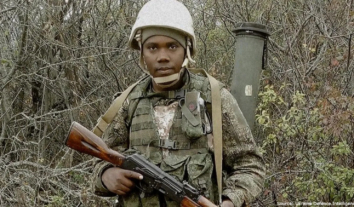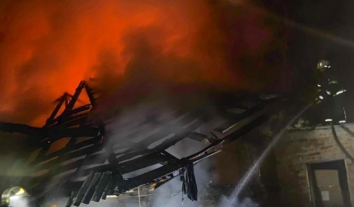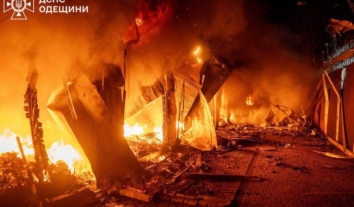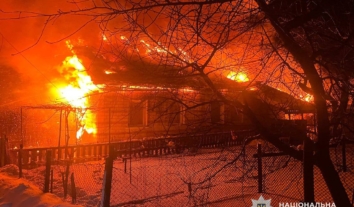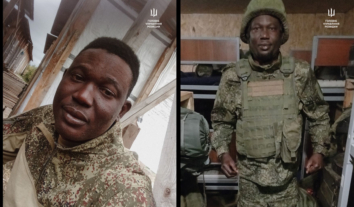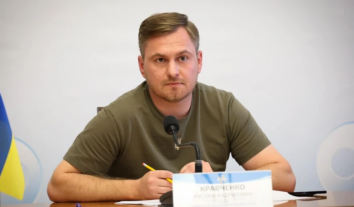How to return Ukrainian journalism to the de-occupied territories?
The claim that the information component of Russia’s aggression against Ukraine is almost as dangerous as its weaponry has been debated since 2014 when Russia occupied Crimea in the South and parts of the Donetsk and Luhansk regions in the East. However, Russian forces began disseminating its propagandistic narratives among Ukrainians long before the open confrontation through its “friendly” visits, books, radio, and television.
The territories on the border with Russia were most affected, and many citizens for years have been exposed to misleading statements about “brotherly nations,” “Banderites,” and “threats” to the Russian language.
Since the invasion, Russians have stopped disguising their propaganda as something innocent. They spread lies, hammering the malign narratives into people’s brains like nails. Russian occupying forces have also destroyed Ukrainian journalism in the temporarily occupied territories.
The work of the media to overcome the consequences of the war after the victory, as well as the participation of journalists in the reconciliation processes, is a crucial task. After all, Ukrainians are not just de-occupying the land but, first and foremost, trying to return its citizens. However, a simple approach, “now we have come to liberate you,” does not work according to journalists. What should work? ZMINA collected the opinions of journalists and experts.
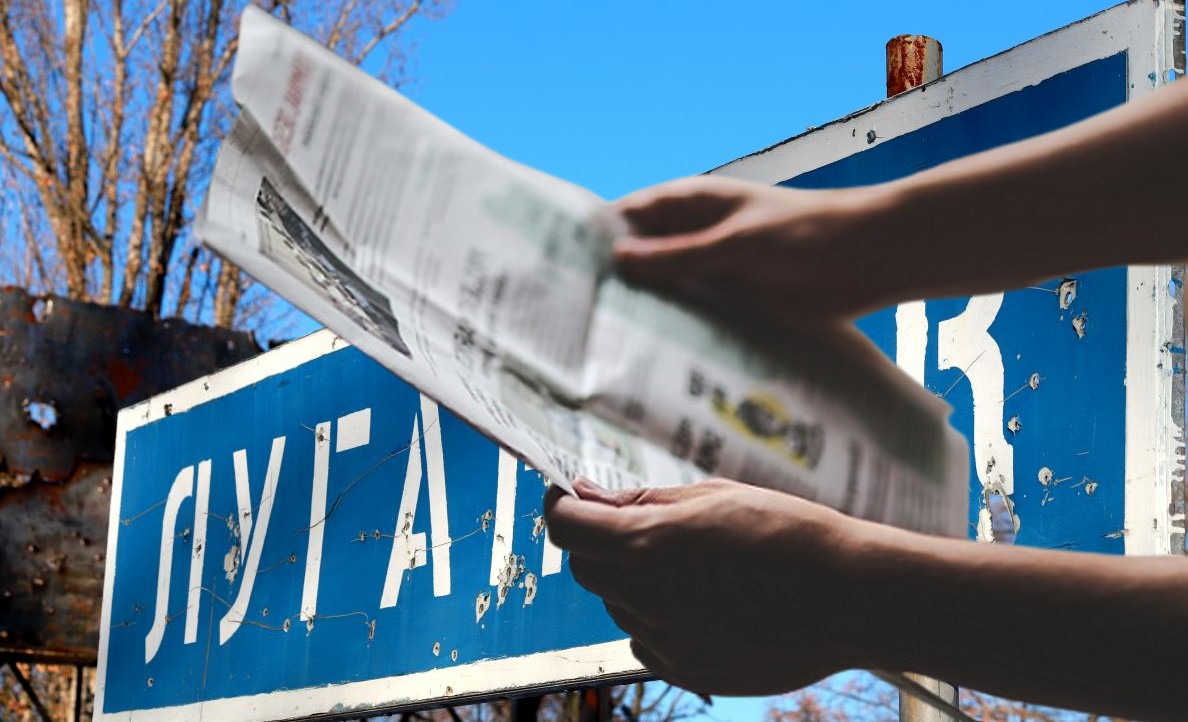 Collage with a newspaper and a Luhansk sign
Collage with a newspaper and a Luhansk signIn 2014, the author of this article worked for a local newspaper. There were two of them in a small town in the Luhansk region. Most residents were looking through the local press for answers to the questions that arose at that time, such as who were these people who started appearing with Russian flags at rallies in the city center, how did the local authorities react, and if they still held power.
Later, there were questions like who gave weapons to people in military uniforms, why they were walking around the city freely, and would pensions and salaries be paid on time or whether people still had jobs.
For some time, the editorial staff of the Luhansk local newspaper tried to give answers, although many journalists did not understand what the future held. In May 2014, it became clear that no Ukrainian government was left in the city. My daughter and I left, and the editorial staff of my former publication, almost entirely, decided to “survive somehow” and began turning into a Russian propaganda resource. Which it still is, albeit under a different name.
This process went quickly. Local “correspondents” were in no hurry to refute falsehoods about the Right Sector [Ukrainian right-wing group], which allegedly was preparing sabotage to topple the Lenin monument on the central square, that local men would be forced to work in a mine for nothing, or that Ukraine was preparing to spray poisonous substances, or that people being killed in Lviv for speaking Russian, and so on.
Over time, the central message of the local newspapers formed: “Russia is here forever; it will protect you.”
Ukrainian media that were available online or via satellite gradually lost impact. They did not report on local events and were almost absent from the information space.
Not everyone in the occupied territories had access to the Internet, and hundreds, if not thousands, of people have never owned a laptop or smartphone. For those residents, the local news source under any government used to be and remains cable television and local print media.
Currently, these are Russian cable television and pro-Russian local media.
The saddest thing is that during the almost nine years of occupation in Donbas, a whole generation has grown up under the influence of enemy propaganda. It will be difficult for them to understand why what they have heard every day was a lie, and their parents, who fought against Ukraine, were wrong, to put it mildly.
Challenges for Ukrainian journalists on the de-occupied territories
The main challenge that Ukrainian media will face in the territories liberated from the Russian occupying forces is how to win the trust of the locals. Is it enough to say that Russians broadcasted lies? Why should people believe that the truth will be told after the de-occupation?
No reintegration will take place as long as the residents of the temporarily occupied territories are under the total informational influence of the aggressor country, said Tetyana Lebedieva, a media manager, member of the Commission on Journalistic Ethics and the Council on Freedom of Speech and Protection of Journalists under the President of Ukraine.
According to Lebedieva, the problem with Ukrainian media on the de-occupied territories is technical [how to return access to media and set up editorial offices of independent outlets there] and psychological due to residents’ exposure to the enemy’s propaganda.
“You can’t just ‘turn on’ the broadcasting with a switch. It will be difficult for people exposed to Russian propaganda for a long time to believe it is possible to criticize someone or investigate something,” Lebedieva says.
In her opinion, the media should talk about what concerns the local audience and look for potential solutions. The most challenging issues are understanding the audience, becoming a relevant news source, and being trusted.
According to Viktoriia Marchenko, editorial director of broadcasting to the temporarily occupied and de-occupied territories and head of the Territory of Struggle project at Ukrainian Radio, it is necessary to understand what to do, how, with what money, and in what sequence to restore the severely damaged [media] infrastructure in the de-occupied territories such as Sievierodonetsk, Mariupol, and other war-torn cities.
Furthermore, according to Marchenko, a lot of attention should be paid to demining efforts on the liberated territories of the Kharkiv and Kherson regions.
She believes that another problem is the lack of journalists who would return. Marchenko recalled that this was already the case after 2014, when media workers had to relocate due to the occupation of Crimea and parts of Donbas. They settled in Kyiv, Kharkiv, and other cities and did not consider returning home.
“I hear my colleagues talking about coming back. But when they see what the cities have become after the occupation, it may make them change their minds,” Marchenko says.
Ukrainian media will face rejection by the local population after the de-occupation of parts of the Luhansk and Donetsk regions, occupied by Russia in 2014, according to Valentyna Troyan.
Troyan is an analyst and representative in the Luhansk region of the Institute of Mass Information, a prominent Ukrainian NGO.
She claims that some people [in the temporarily occupied territories] are firmly hooked on Russian propaganda. Most residents of these territories had and still have relatives in Russia. In addition, the Russians have been trying to integrate these areas into their cultural information space in every possible way, and this did not begin in 2014.
“Let’s recall the visits of Russian politicians to these areas [of the Donetsk and Luhansk regions]. In 2008, Russian State Duma deputy Konstantin Zatulin visited Luhansk and participated in unveiling a monument to “residents of Luhansk region who fell at the hands of nationalist punishes.” Members of the heroic and patriotic club “Young Guard,” which operated based on the museum of the same name, have repeatedly traveled to Russia with performances,” she says.
Previously, the Ukrainian authorities could deny entry to Zatulin, and he was persona non grata for some time. In other words, bureaucratic procedures could have complicated the brainwashing, she believes.
But after the Russians occupied these territories, any obstacles disappeared. Propagandists can do whatever they want in the information space. They can make up any nonsense.
According to Diana Dutsyk, a media expert and executive director of the Ukrainian Institute of Media and Communication, a non-profit organization, decoding the minds of people who have lived under Russian occupation for a long time, i.e., for more than a year or since 2014, will be one of the most challenging tasks for Ukrainian journalists after the liberation of the territories. And this issue cannot be resolved by simply returning Ukrainian media to the de-occupied cities and villages, she believes.
“Returning Ukrainian newsrooms – it is the easiest thing to do. Donors will help, and the government can help by creating the right conditions. But there will be a question of trust in the media that will return. After all, the consciousness of the residents of the occupied territories has been poisoned by aggressive Russian propaganda for a long time,” the expert says.
In her opinion, we should consider various measures involving specialists from multiple fields, from psychologists to journalists and educators. Education and educational projects will play an essential role in this coordinate system, says Diana Dutsyk. It is about media literacy and creating a favorable background for Ukrainian culture and education.
“In 2016-2017, I visited some schools in the Luhansk and Donetsk regions on the demarcation line. I was shocked to see that school libraries still had Soviet book collections. Those libraries had neither the money nor the means to buy contemporary Ukrainian literature, including professional literature, not just fiction. Russia had occupied these territories in the intellectual and cultural sense long before the war began in 2014. That is why we have such consequences. And today, we have to work to bring these people back to the Ukrainian media and cultural field,” she said.
At the same time, journalist Natalia Trofimova-Penkova, who moved to Dnipro and later to Lviv after the occupation of Luhansk, believes there will be no problems with the local population after de-occupation—another thing about “colleagues” from the media.
How to support journalism after de-occupation?
The staffing issue may become acute after the liberation of the territories from the Russians. First, some local journalists will not want to return for various reasons. Secondly, the media should involve residents in the Ukrainian public space and participate in the reconciliation process, which is another specificity requiring professional training or at least constant consultations with experts.
According to Trofimova-Penkova, some hope can be placed on students currently studying at universities, including those displaced.
Victoria Humeniuk, a lecturer and executive director of the Student Journalism Platform NGO, shares the same opinion. She believes that displaced universities retain their identity and that they are the ones who train human resources for the de-occupied territories.
The Ukrainian state currently provides little support to the media, so her NGO is ready to share its experience on how to get support from international organizations to produce high-quality, independent journalism.
Andriy Shchekun, editor-in-chief of the Krymska Svitlytsia newspaper and coordinator of the Humanitarian Policy Group of the Crimean Platform Expert Network, believes that displaced media, such as his publication, as well as Krym Realii, Holos Kryma, and Crimean Platform experts, will provide the necessary assistance to journalists in the de-occupied territories. They are knowledgeable and are developing the information policy that the state needs, Shchekun is convinced.
According to Kateryna Shynkevych, Ph.D. in History, Associate Professor of the Department of Law and Public Administration at the Zaporizhzhia Institute of Economics and Information Technology, it is already necessary to form a separate pool of journalists who will clearly understand what the reconciliation process is.
“The de-occupied territories are not only about information policy, propaganda, and bringing completely different groups of people to the same denominator so that they understand that they live within the same country and information space. We need to teach them to speak correctly about violence, deportation, and murder,” she said.
She believes it is necessary to train dozens of people who can work with delicate matters, the psychology of people, because reconciliation in Ukraine will begin in different regions in different periods.
As an example, the expert cited the situation with the media in the countries of the former Yugoslavia, where the last war on the continent before the Russian-Ukrainian war took place. The expert noted that reconciliation in the Balkan societies began ten years ago.
She emphasized that the Balkan experience can be studied but cannot be used as a basis for Ukraine. However, we can learn from their mistakes.
“What are the Balkan media doing in the reconciliation process? They cover everything one-sidedly: trials, war crimes… Hate speech still dominates the information space, even though hate speech has been recognized as an instrument of Slobodan Milosevic‘s regime. Local media do not cooperate with civil society and the government at all. They are trying to hush up topics currently relevant to Ukrainian society: sexual violence, deportations, and missing persons. Such topics rarely appear in the local media during the reconciliation process,” the expert said.
The issue of the government and the media not being involved in the reconciliation process has only been raised over the past five or six years, and only in a country that has suffered greatly from the war, like Bosnia and Herzegovina. According to Shynkevych, the media began to work with sensitive topics there. The same processes have begun in Kosovo.
In general, we should remember that the process of reconciliation will last for years in Ukraine after the victory, and it has been going on for 25 years in the Balkans, she reminded:
“Reconciliation is a part of transitional justice, working with the past. We need to understand it and move on.”
How can journalists get ready for work on the de-occupied territories?
According to Anna Serdyuk, editor-in-chief of the Free Radio from Bakhmut, we should prepare for work in the de-occupied territories before the victory. At the same time, we need to prepare people for the return of the Ukrainian government. To do this, we need to at least learn about their concerns.
The journalist said that the editorial office communicates with people under occupation. In particular, they asked what people feared during the de-occupation process.
“We know nothing about those territories: where roads are destroyed, where there is no water… We can’t just say, “We are good, and we are here to save you!” In any case, the locals see the counteroffensive process as something “coming to them.” Some Ukrainians understand the risks and why this is happening, but some do not favor Ukraine’s return, which will not bring them back to us. There should be preliminary work with people in the occupied territories right now,” Anna Serdyuk is convinced.
Valentyna Troyan says the only way out is to start working immediately after the de-occupation. Still, it is already possible to conduct surveys and collect information about the concerns of the residents of the occupied territories and what they are afraid of. They are scared of accountability, first of all.
“None fully understands who can be recognized as a collaborator in Ukraine. So we need to start with explanatory work. The same applies to Russian passports – it needs to be clearly explained who can be punished for obtaining one. This is unlikely to apply to someone who worked as a cleaner in some “state institution” and received this passport under duress. But people are sure there will be punishment,” says Valentyna Troyan.
In addition, the media must keep in touch with the audience and organize events to help people find common ground when they resume work in the de-occupied territories.
According to the journalist, it will be most difficult with children whose parents fought against Ukraine:
“If we want to integrate not only territories but also people, we need to approach each group separately, studying their needs and fears.”
Another essential condition for reintegration, mentioned by Diana Dutsyk, is that only Ukrainian-language content should be used by the media that enter the de-occupied territories.
“This is a fundamental issue, and talk of it being uncomfortable or irreconcilable is disingenuous. For example, those who have moved from the country’s East to the West understand Ukrainian perfectly and are gradually adapting,” she said.
Returning Ukrainian journalism to the de-occupied territories so that people trust and need it is a long, complex process with many nuances for each region and time. But experts see the basic principles of restoring Ukrainian media as follows:
- Block the influence of Russian propaganda as much as possible (jamming the broadcast signal, issuing court injunctions, blocking hostile online resources, etc.)
- Answer questions from residents; do not hide problems.
- Talk about what is essential and valuable.
- Involve specialists in conflict studies.
- Support print media since access to electronic media may be complex due to the destruction of infrastructure.
- Tell the truth.
- Work according to journalistic standards, following the Code of Ethics for Ukrainian Journalists.


